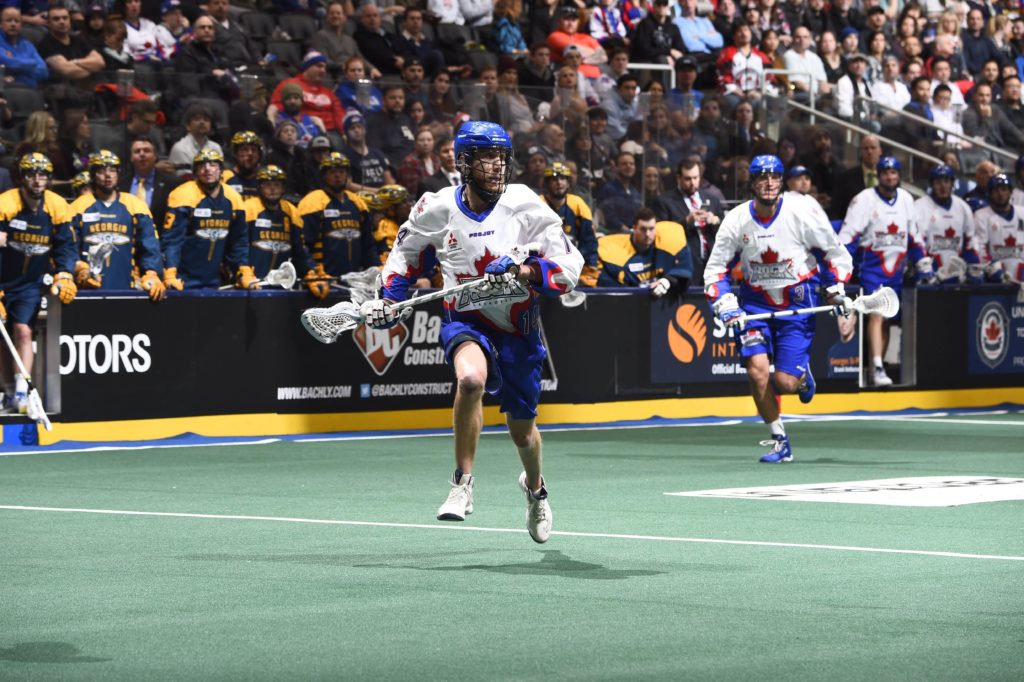By Anna Taylor
Earlier this month the Toronto Rock teamed up with Bell Let’s Talk at their January 14 home opener to promote mental health initiatives and Bell Let’s Talk Day, which takes place on Wednesday, January 25.
The Toronto Rock donated $1 per single-game ticket sold to the home opener to the Canadian Mental Health Association – Toronto branch. Rock Owner Jamie Dawick personally matched that $1 donation, doubling the fundraising total! Bell has donated more than 79 million dollars to mental health programs through their Bell Let’s Talk Day awareness program.
Lacrosse is played for the love of the game. Injuries to professional players can be more than just physical. When people are prevented from doing what they’re passionate about, it’s difficult to deal with.
It’s not just that they can’t play; it’s the pain from the injury and the possible surgery they have to endure. It’s the long road through rehabilitation. They’re not just sitting around waiting to get better. They’re putting their bodies through hell to get back what they lost and that takes a toll on the brain, too.
The Rock’s injury woes over the past year have been well documented. Currently four players are on the IR, working their way back from serious injuries.
Rob Marshall, Brandon Miller, and Brock Sorensen all recognize the importance of taking care of their mental health as well as their physical health.
Marshall tore his hamstring in December. Miller tore his hip labrum which required a reshaping of the hip socket. Sorensen tore the ACL in his knee, and it’s not the first time he’s had that particular injury. The latter two had surgery in July and are coming up on the six-month mark in the recovery process.
All three have had injuries that have kept them out of important games in the past, although for Miller, this is the first major injury of his career and it really opened his eyes to the intricacies of the recovery process.
“I’ve never had an injury like this and I’m 37 so it does weigh pretty heavily on you,” Miller admits. “I haven’t had a lot of practice with [the mental] side of an injury. Can you come back, and will your play will be as good as it once was? You bat that around a lot in your head and that’s part of fighting through the injury.”
“When it first happens, it’s almost like the world as you know it is ending,” Sorensen reflects. “But when you get past that first mental battle you feel some optimism with the progression you make in rehab.”
Marshall says that for him, managing his emotions got easier as he got older.
“Earlier in your career you get down on yourself for not being able to get out there and play,” he says, “but keeping a positive attitude in the room helps and a lot of that is encouraging the other players and showing support for them when you can.”
All the athletes agree that being in a team environment aids in recovery.
“It’s unfortunate but you see guys around you, that have been through the same thing, that you can talk to and bounce ideas off of,” Sorensen says. “It definitely helps alleviate some of the mental concern that’s going on as you progress.”
Miller believes being around the team gives the injured players a boost.
“It’s not until you’re back around the guys that you can say ‘absolutely, I’ve got to give it a shot no matter what,” he says.
“We are a family here and we bring out the best in each other,” Marshall states.
All three players recognize the importance of Bell Let’s Talk Day and the good that it does for Canadians.
“There are a lot more people coming out and expressing that they’ve had depression and are more comfortable saying that they have that pain. Unless you say something, nobody’s ever going to know you need help,” Sorensen says.
“You don’t really know what battles people are going through, whether they fake the smile on their face or not,” Miller stresses. “Whether it’s yourself or a family member, it hits close to home. I think everyone knows a few people who have struggled with their mental health.”
So, will the players be tweeting on January 25th in support of #BellLetsTalk?
“Of course, always,” says Marshall.
“I try to stay somewhat active on Twitter and that’s usually a day that my phone battery dies so I’ll be tweeting for sure,” says Miller.
Check out the Bell Let’s Talk website to find out how you can help #EndTheStigma and raise funds for mental health initiatives on January 25th.



